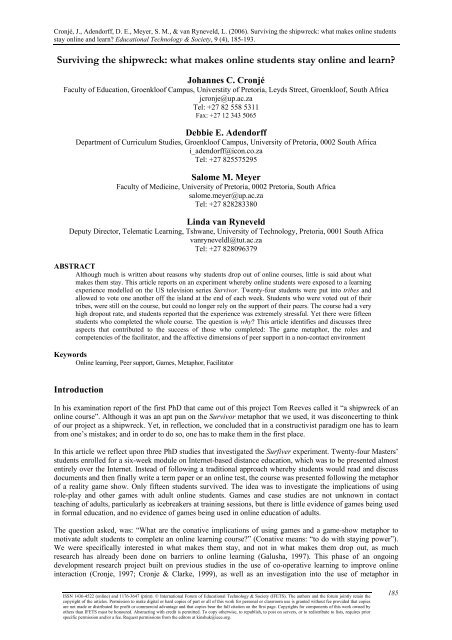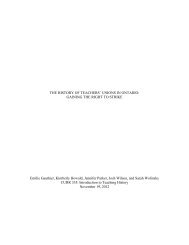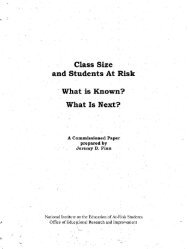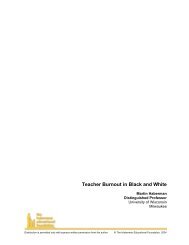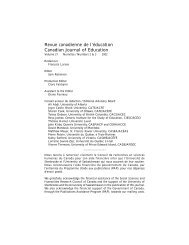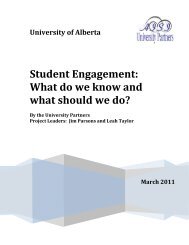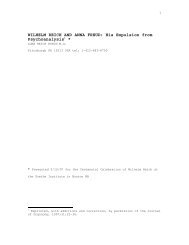October 2006 Volume 9 Number 4
October 2006 Volume 9 Number 4
October 2006 Volume 9 Number 4
Create successful ePaper yourself
Turn your PDF publications into a flip-book with our unique Google optimized e-Paper software.
Cronjé, J., Adendorff, D. E., Meyer, S. M., & van Ryneveld, L. (<strong>2006</strong>). Surviving the shipwreck: what makes online students<br />
stay online and learn? Educational Technology & Society, 9 (4), 185-193.<br />
Surviving the shipwreck: what makes online students stay online and learn?<br />
Johannes C. Cronjé<br />
Faculty of Education, Groenkloof Campus, Universtity of Pretoria, Leyds Street, Groenkloof, South Africa<br />
jcronje@up.ac.za<br />
Tel: +27 82 558 5311<br />
Fax: +27 12 343 5065<br />
Debbie E. Adendorff<br />
Department of Curriculum Studies, Groenkloof Campus, University of Pretoria, 0002 South Africa<br />
i_adendorff@icon.co.za<br />
Tel: +27 825575295<br />
Salome M. Meyer<br />
Faculty of Medicine, University of Pretoria, 0002 Pretoria, South Africa<br />
salome.meyer@up.ac.za<br />
Tel: +27 828283380<br />
Linda van Ryneveld<br />
Deputy Director, Telematic Learning, Tshwane, University of Technology, Pretoria, 0001 South Africa<br />
vanryneveldl@tut.ac.za<br />
Tel: +27 828096379<br />
ABSTRACT<br />
Although much is written about reasons why students drop out of online courses, little is said about what<br />
makes them stay. This article reports on an experiment whereby online students were exposed to a learning<br />
experience modelled on the US television series Survivor. Twenty-four students were put into tribes and<br />
allowed to vote one another off the island at the end of each week. Students who were voted out of their<br />
tribes, were still on the course, but could no longer rely on the support of their peers. The course had a very<br />
high dropout rate, and students reported that the experience was extremely stressful. Yet there were fifteen<br />
students who completed the whole course. The question is why? This article identifies and discusses three<br />
aspects that contributed to the success of those who completed: The game metaphor, the roles and<br />
competencies of the facilitator, and the affective dimensions of peer support in a non-contact environment<br />
Keywords<br />
Online learning, Peer support, Games, Metaphor, Facilitator<br />
Introduction<br />
In his examination report of the first PhD that came out of this project Tom Reeves called it “a shipwreck of an<br />
online course”. Although it was an apt pun on the Survivor metaphor that we used, it was disconcerting to think<br />
of our project as a shipwreck. Yet, in reflection, we concluded that in a constructivist paradigm one has to learn<br />
from one’s mistakes; and in order to do so, one has to make them in the first place.<br />
In this article we reflect upon three PhD studies that investigated the Surfiver experiment. Twenty-four Masters’<br />
students enrolled for a six-week module on Internet-based distance education, which was to be presented almost<br />
entirely over the Internet. Instead of following a traditional approach whereby students would read and discuss<br />
documents and then finally write a term paper or an online test, the course was presented following the metaphor<br />
of a reality game show. Only fifteen students survived. The idea was to investigate the implications of using<br />
role-play and other games with adult online students. Games and case studies are not unknown in contact<br />
teaching of adults, particularly as icebreakers at training sessions, but there is little evidence of games being used<br />
in formal education, and no evidence of games being used in online education of adults.<br />
The question asked, was: “What are the conative implications of using games and a game-show metaphor to<br />
motivate adult students to complete an online learning course?” (Conative means: “to do with staying power”).<br />
We were specifically interested in what makes them stay, and not in what makes them drop out, as much<br />
research has already been done on barriers to online learning (Galusha, 1997). This phase of an ongoing<br />
development research project built on previous studies in the use of co-operative learning to improve online<br />
interaction (Cronje, 1997; Cronje & Clarke, 1999), as well as an investigation into the use of metaphor in<br />
ISSN 1436-4522 (online) and 1176-3647 (print). © International Forum of Educational Technology & Society (IFETS). The authors and the forum jointly retain the<br />
copyright of the articles. Permission to make digital or hard copies of part or all of this work for personal or classroom use is granted without fee provided that copies<br />
are not made or distributed for profit or commercial advantage and that copies bear the full citation on the first page. Copyrights for components of this work owned by<br />
others than IFETS must be honoured. Abstracting with credit is permitted. To copy otherwise, to republish, to post on servers, or to redistribute to lists, requires prior<br />
specific permission and/or a fee. Request permissions from the editors at kinshuk@ieee.org.<br />
185


